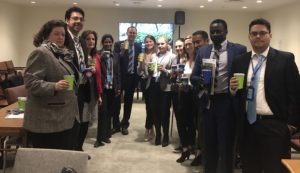Media Contact: Lindsay Cobb
Mobile: +1 (304) 266-7626
Email: Lindsay@trees.org
FOR IMMEDIATE RELEASE
THE UNITED NATIONS INSTITUTE FOR TRAINING AND RESEARCH AND TREES FOR THE FUTURE HOST WORKSHOP ON USING AGROFORESTRY TO MEET THE SDGS
March 4, 2019 (Silver Spring, MD) — Trees for the Future (TREES), in collaboration with the United Nations Institute for Training and Research New York Office (UNITAR), organized the first workshop of their three-part series on Using Agroforestry to Meet the SDGs that took place on Thursday, February 28th, 2019 at the United Nations Headquarters in New York.
This series is a part of the ongoing execution of UNITAR and TREES’ Memorandum of Understanding signed last year to develop and implement training activities.
The main objective of the series is for international development leaders and agroforestry practitioners to learn the crucial impacts that Trees for the Future’s Forest Garden Approach has on ending hunger, poverty and deforestation. Participants will learn key agroforestry techniques and training facilitation skills required to pass the Forest Garden Certification Exam. Once a Certified Forest Garden Trainer, anyone, anywhere can participate in Trees for the Future’s global learning community of trainers working across the developing world to meet multiple SDGs.
TREES’ work impacts the following Sustainable Development Goals:
- Goal 1: End poverty in all its forms everywhere
- Goal 2: End hunger, achieve food security and improved nutrition and promote sustainable agriculture
- Goal 3: Ensure healthy lives and promote well-being for all at all ages
- Goal 8: Promote inclusive and sustainable economic growth, employment and decent work for all
- Goal 10: Reduce inequality within and among countries
- Goal 12: Ensure sustainable consumption and production patterns
- Goal 13: Take urgent action to combat climate change and its impacts
- Goal 15: Sustainably manage forests, combat desertification, halt and reverse land degradation, halt biodiversity loss
- Goal 17: Revitalize the global partnership for sustainable development
The full-day introductory training session, Establishing Forest Gardens, was open to all UN members and special guests, including staff from the Permanent Missions, individuals from numerous NGOs, and participants from countries currently facing threats of severe poverty and deforestation. TREES’ Executive Director John Leary shared knowledge and experience in the implementation of the Forest Garden Approach, how to overcome challenges in creating sustainable smallholder farming systems, and meeting nutritional needs.
To introduce the necessary steps that must be taken in addressing the struggles commonly experienced in agricultural development, Leary had the group engage in a series of practical exercises including designing a practical Forest Garden, creating examples of protective fences, communication skill activities, nutritional understanding, and seed starting.
The rest of the series will focus on diversification, optimization, and financial and marketing training so that farmers can sustainably meet the full potential of their Forest Gardens, meet their financial and nutritional needs, and compete in market sectors at all times of the year. The next workshop will be held on Thursday, March 27th, 2019 at the United Nations Headquarters in New York. More details and registration are available at www.unitar.org/event/full-catalog/diversifying-nutrition-and-income-sources.
For more information on the Forest Garden Training Center, visit training.trees.org.
###
Trees for the Future is working to end hunger and poverty for smallholder farmers through revitalizing degraded lands. Learn more about Trees for the Future and see their latest data in the TREES 2018 Impact Report.
The United Nations Institute for Training and Research (UNITAR) is the dedicated training and capacity building arm of the United Nations and has the mandate to enhance the effectiveness of the UN through diplomatic training. Through public awareness-raising, education, and training of public policy officials, UNITAR has focused on enhancing global decision-making and supporting country-level action, to create a world in which individuals, institutions, and organizations are equipped with the knowledge, skills, and capacities to overcome global challenges.
Contributing meaningfully to the implementation of the 2030 Sustainable Development Agenda and helping countries achieve the Sustainable Development Goals requires us to rethink how our organizational capital is structured and interacts. The Institute continuously evolves to best match the needs of the diplomatic community and the UN Agenda. Under the leadership of Executive Director Mr. Nikhil Seth, UNITAR is implementing a wide range of activities across the development spectrum as introduced in its Strategic Framework 2018-2021. These are organized under five thematic pillars: Peace, People, Planet, Prosperity, and Cross-fertilizing Knowledge and Expertise.
 United States
United States

Comments